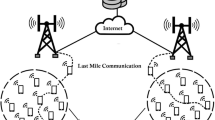Abstract
Coventional TCP has several performance problems when deployed over long delay, high link error rate satellite connections. Long delay causes the TCP to open up slowly resulting in low bandwidth utilization. High link error rate affects the performance by slowing down transmission rate unnecessarily every time a data loss occurs. In this paper, we propose an efficient end to end flow control scheme, we name TCP Seamless, for TCP over satellite. Our proposal offers a fast opening up of transmission rate to effectively utilize the bandwidth as early as possible. At the occurrence of data loss, our scheme can determine whether the loss was caused by link error or due to congestion. In case of link error, TCP Seamless can restore the transmission rate in a transparent manner. Also during congestion, without violating the netiquette, our scheme can get more data segments acknowledged at a faster rate. The core of our proposal lies in probing the network using low priority data segments. Also we propose two new algorithms, namely, Express Start and Seamless Recovery for satellite TCP to attain our goals. Both operational description and simulation results show that our scheme yields the best throughput for TCP over satellite. Moreover, in doing so, it needs less overhead than its nearest counterpart, TCP Peach.
Similar content being viewed by others
References
I.A. Akyildiz, G. Morabito and S. Palazzo, TCP-Peach: A new congestion control scheme for satellite IP networks, IEEE/ACMTransactions on Networking 9(3) (2001) 307-321.
M. Allman et al., Increasing TCP's initial window, RFC 2414 (1998).
M. Allman et al., Ongoing TCP research related to satellites, RFC 2760 (2000).
A. Bakre and B.R. Badrinath, I-TCP: Indirect TCP for mobile hosts, in: Proc. 15th Internat. Conf. on Distributed Computing Systems, 1995.
H. Balakrishnan, V. Padmanavan, S. Seshan and R. Katz, A comparison of mechanisms for improving TCP performance over wireless links, IEEE/ACMTransactions on Networking 5(12) (1997) 756-769.
H. Balakrishnan, S. Seshan and R. Katz, Improving reliable transport and handoff performance in cellular wireless networks, ACM Wireless Networks 1(4) (1995).
A. DeSunibem, N. Chuah and O. Yue, Throughput performane of transport layer protocols over wireless LANs, in: Proc. of GLOBECOM'93, 1993.
K. Fall and K. Varadhan, tins-Notes and documentation, Technical Report, The VINT Project, UC Berkeley, LBL, USC/ISI and Xerox PARC (2002).
S. Floyd, J. Mahdavi, M. Mathis and M. Podolsky, An extension to the selective acknowledgement (SACK) option for TCP, RFC 2883 (2000).
V. Jacobson, Congestion avoidance and control, in: Proc. of ACM SIGCOMM, California, USA, 17-19 August 1988, pp. 314-329.
V. Jacobson, R. Braden and D. Borman, TCP extensions for high performance, RFC 1323 (1992).
R. Jain, The Art of Computer System Performance Analysis (Wiley, New York, 1991).
T.V. Laksman and U. Madhow, The performance of TCP/IP for networks with high bandwidth-delay products and random loss, IEEE/ACM Transactions on Networking 5 (1997).
R. Ludwig and R. Katz, The Eifel algorithm: Making TCP robust against spurious retransmissions, ACM Computer Communication Review 30(1) (2000).
M. Mathis, J. Mahdavi, A. Romanow and S. Floyd, TCP selective acknowledgement options, RFC 2018 (1996).
C. Metz, TCP over satellite. The final frontier, IEEE Internet Computing (January/February 1999) 76-80.
NS-2, UCB/LBNL/VINT network simulator, available at http://www.isi.edu/nsnam/ns/ (2002).
V. Padmanavan and R. Katz, TCP Fast Start: A technique for speeding UPWeb transfers, in: Proc. of IEEE GLOBECOM Conf., Sydney, Australia, November 1998.
C. Partridge and T.J. Shephard, TCP/IP performance over satellite links, IEEE Network Magazine (September/October 1997) 44-49.
M. Perloff and K. Reiss, Improvements to TCP performance, Communications of ACM 38 (February 1995) 90-100.
J.B. Postel, Transmission control protocol, RFC 793 (1981).
W. Stevens, TCP slow start, congestion avoidance, fast retransmit, and fast recovery algorithms, RFC 2001 (1997).
W.R. Stevens, TCP/IP Illustrated, Vol. 1 (Addison-Wesley/Longman, Reading, MA, 1994).
S. Utsumi, S.M.S. Zabir and N. Shiratori, An efficient approach to improve TCP performance over wireless networks, in: Lecture Notes in Computer Science, Vol. 2510 (Springer, New York, 2002) pp. 916-925.
N. Vaidya, M. Mehta, C. Perkins and G. Montenegro, Delayed duplicate acknowledgements: A TCPunaware approach to improve performance of TCP over wireless, Journal of Wireless Communications and Wireless Computing (1999).
S.M.S. Zabir, A. Ashir and N. Shiratori, An efficient flow control approach for TCP over wireless Networks, Journal of Circuits, Systems, and Computers, to appear.
Author information
Authors and Affiliations
Rights and permissions
About this article
Cite this article
Zabir, S.M.S., Kitagata, G. A Proposal for Efficient TCP Flow Control over Satellite Networks. Telecommunication Systems 25, 371–400 (2004). https://doi.org/10.1023/B:TELS.0000014790.85830.f3
Issue Date:
DOI: https://doi.org/10.1023/B:TELS.0000014790.85830.f3




